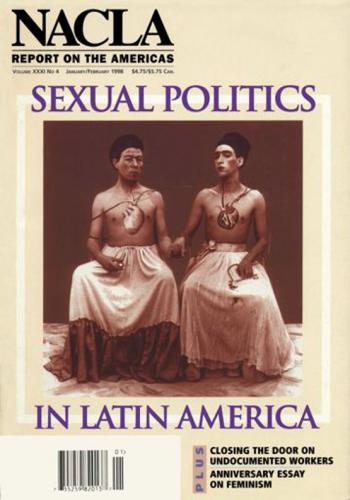Article
When I lived in Mexico during the 1950s, I used to visit Alaide Foppa de Sol6rzano, who many years later would die, cruelly tortured, at the hands of the Guatemalan mili- tary. An incredibly cultivated woman, she was then in exile, her talents on hold, and patiently attending meetings where men discussed politics and the women sat aside as nonparticipants.
Activist groups have initiated an aggressive cam- paign to repeal Article 103 of the Penal Code, which defines sodomy as a criminal act and promotes an atmosphere of intolerance and violence against sexual minorities. Puerto Rico is one of three countries in Latin America, along with Chile and Nicaragua, where both consensual and nonconsensual same-sex sexual relations are still legally defined as a crime.
The story of the virtual enslavement of dozens of deaf Mexicans in two houses in Queens made national and international headline icans were forced to the New York City s and sell at least $100 dollar trinkets per day ishment or even bea employers. While the this case was well place is not a unique one.
Women have abortions, whether it is legal or not. The question, then, is not whether we agree or disagree with abortion, but whether we choose life or death for women.
As in many parts of the world, AIDS first arrived in Brazil in the early 1980s through sensational- istic media coverage of a mysteri- ous North American "gay plague" or "gay moting safer cancer." In 1983, Markito, a renowned for "men who h, fashion designer whose homosexuality sex with me was common knowledge, became the first Brazilian public figure to die from HIV-related illness, bolstering the connection between AIDS and homosex- uality in the Brazilian popular imagination.
Midway through the cere- mony in which Patricio Aylwin was being offi- cially nominated as the presiden- tial candidate of the democratic opposition in August, 1989, Las Yeguas del Apocalipsis (The Mares of the Apocalypse), a gay performance group, dramatically unfurled a large banner that read "Homosexuals for Change." Pre- sent at the ceremony-which marked the beginning of Aylwin's campaign to be Chile's first democratically elected president since Salvador Allende-were most of the prominent political New political horizons emerged for the gay movement in the wake of Pinochet's defeat.
In August, 1996, the Statutory Assembly charged with drafting a new statute for the city of Buenos Aires unanimously approved the inclusion of a clause recognizing "the right to be different" and con- demning all forms of discrimination, including those based on sexual orientation. The clause had been proposed by Maria Jose Lubertino, a feminist politi- cian and member of the Assembly who has long worked with lesbian organizations.
Latin America Catches the "Asian Flu" NEW YORK, DECEMBER 10, 1997 Traders love to invent cute names for proliferating finan- cial panics. Collateral damage done to Latin American stock and currency prices by Mexico's 1994-95 crisis was called the "tequila effect.
Lawrence M. La Fountain-Stokes
Mema's House, Mexico City: On Transvestites, Queens, and Machos by Annick Prieur, University of Chicago Press, 1998, 264 pp., S50.
The Catholic Church and conservative politicians have launched aggressive local and national campaigns for "family values" and sexual abstinence, and against condom use. This offensive has shaped the embattled debates and activism around sexual politics in Mexico.
The outbreak of the AIDS epidemic in the early 1980s was a turning point for sexual minorities in Latin America, where few well-established movements for homosexual liberation existed before the arrival of HIV. Although lesbians had won spaces within feminist and women's movements as part of a broader struggle for gender equality and reproductive rights, sexual minorities had been unable to articulate themselves as an autonomous political force within the reformist and rev- olutionary projects of the 19 6 0s and 1970s.
Argentina: Has Menemismo Run Its Course? Politics in Argentina have been so thoroughly dominated by the neoliberal economic poli- cies of President Carlos Menem that the upset victory of the opposition Alliance for Jobs, Justice and Education in last October's legisla- tive election was celebrated by many observers as the first crack to appear in the Peronist government. Indeed, this is the first electoral defeat for Menem and his Justi- cialista Party (PJ) since taking office in 1989.
I never met Cesitar. At a meeting of religious leaders on the issue of If homosexuality, his father described him to us as he showed us his picture.

